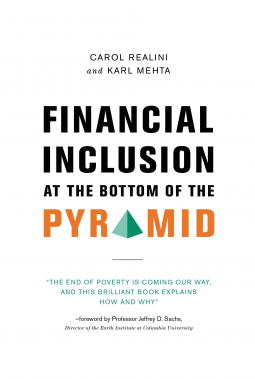
Financial Inclusion at the Bottom of the Pyramid
How Global Innovation Will Create a Fully Banked World
by Carol Realini and Karl Mehta
This title was previously available on NetGalley and is now archived.
Send NetGalley books directly to your Kindle or Kindle app
1
To read on a Kindle or Kindle app, please add kindle@netgalley.com as an approved email address to receive files in your Amazon account. Click here for step-by-step instructions.
2
Also find your Kindle email address within your Amazon account, and enter it here.
Pub Date Sep 01 2015 | Archive Date Aug 15 2015
Description
Times are changing rapidly, but despite global uncertainty, technology has the capacity to reach and equip people in all walks of life. Advances in communications have reconfigured the ease with which we interact with our money—and these advances can provide innovative financial services to the unbanked and underserved throughout the world. Financial inclusion for all is indeed within our reach, and with this conviction, authors Karl Mehta and Carol Realini propose a vision for a better world and a blueprint to get there.
A Note From the Publisher
Book available in hardcover, paperback, and eBook.
Publish date is tentative, sale price not determined at this time.
Book available in hardcover, paperback, and eBook.
Available Editions
| EDITION | Other Format |
| ISBN | 9781460265529 |
| PRICE | $0.00 (USD) |
Links
Average rating from 6 members
Featured Reviews
 Reviewer 153322
Reviewer 153322
I have long been an advocate for small-scale banking and microlending as an effort against payday loans and $100 crises that send people into years' long spirals of debts and insecurity. Transfer fees, money orders, charges on ATM withdrawls, the physical risks of carrying cash and banks inaccessible to "global financial nomads" without huge initial deposits make being poor extremely expensive and unnecessarily punitive for working people. Realini studies innovative solutions made possible by ubiquitous technology, particularly mobile phones, which offer global, no-frills accounts and the ability to take in deposits of checks by photo, swipe credit cards and pay via a chip and pin or QR codes. The security implication is very clear as well--money moved via traditional halwa networks is impossible to trace, but people use the halwa networks because they are starved of other methods. Offer easy, better financial transactions and the halwa fade away, leaving crime and terrorism finances fewer places to hide.
Readers who liked this book also liked:
John Kotter; Holger Rathgeber
Business, Leadership, Finance, Nonfiction (Adult)







